高考英语语法必考考点代词
- 格式:doc
- 大小:171.50 KB
- 文档页数:20
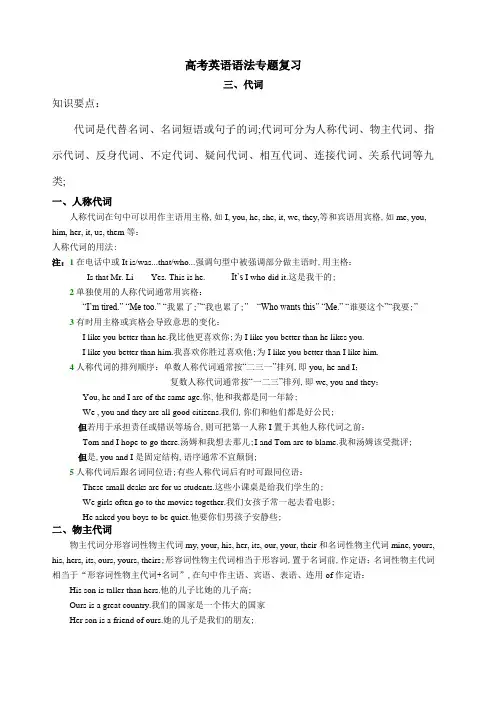
高考英语语法专题复习三、代词知识要点:代词是代替名词、名词短语或句子的词;代词可分为人称代词、物主代词、指示代词、反身代词、不定代词、疑问代词、相互代词、连接代词、关系代词等九类;一、人称代词人称代词在句中可以用作主语用主格,如I, you, he, she, it, we, they,等和宾语用宾格,如me, you, him, her, it, us, them等:人称代词的用法:注:1在电话中或It is/was...that/who...强调句型中被强调部分做主语时,用主格:---Is that Mr. Li ---Yes. This is he. It’s I who did it.这是我干的;2单独使用的人称代词通常用宾格:“I’m tired.” “Me too.” “我累了;”“我也累了;”“Who wants this” “Me.” “谁要这个”“我要;”3有时用主格或宾格会导致意思的变化:I like you better than he.我比他更喜欢你;为I like you better than he likes you.I like you better than him.我喜欢你胜过喜欢他;为I like you better than I like him.4人称代词的排列顺序:单数人称代词通常按“二三一”排列,即you, he and I;复数人称代词通常按“一二三”排列,即we, you and they:You, he and I are of the same age.你,他和我都是同一年龄;We , you and they are all good citizens.我们,你们和他们都是好公民;但若用于承担责任或错误等场合,则可把第一人称I置于其他人称代词之前:Tom and I hope to go there.汤姆和我想去那儿;I and Tom are to blame.我和汤姆该受批评;但是,you and I是固定结构,语序通常不宜颠倒;5人称代词后跟名词同位语;有些人称代词后有时可跟同位语:These small desks are for us students.这些小课桌是给我们学生的;We girls often go to the movies together.我们女孩子常一起去看电影;He asked you boys to be quiet.他要你们男孩子安静些;二、物主代词物主代词分形容词性物主代词my, your, his, her, its, our, your, their和名词性物主代词mine, yours, his, hers, its, ours, yours, theirs;形容词性物主代词相当于形容词,置于名词前,作定语;名词性物主代词相当于“形容词性物主代词+名词”,在句中作主语、宾语、表语、连用of作定语:His son is taller than hers.他的儿子比她的儿子高;Ours is a great country.我们的国家是一个伟大的国家Her son is a friend of ours.她的儿子是我们的朋友;This is your pen. Mine is in the box.这是你的铅笔,我的在铅笔盒里;注:1 a friend of mine ours, yours, hers, his, theirs结构2 物主代词与own连用;表强调;也可用of one’s own置于名词后作定语:Mind your own business.别管闲事;I saw it with my own eyes.那是我亲眼看到的;I hope to have a room of my own. / I hope to have my own house.我希望有自己的房子;三、指示代词指示代词是用来指代或标记人或事物的代词,表示“这个,这些”“那个,那些”;在句中可作主语、宾语、表语、定语;单数:this, that;复数:these, those;为了方便学习将such,so也归于此类;I like these and he likes those.我喜欢这些,他喜欢那些;What I want to say is this.我想说的就是这点;注:1 指示代词用作主语和定语时,可指人或物;用作宾语和表语时,只指物;如:This is my father. 作主语,指人Do you know this作宾语,指物,译为“你知道这个情况吗2 刚提到的或已经完成的事情时用that,但是若要指下文将要发生或将要提到的事情通常用this:She married Jim, and that surprised me.她嫁给了吉姆,这使我感到很吃惊;I want to know this: Is he healthy我想知道这一点:他是否很健康;3 在打电话时,通常用this指自己,用that指对方:Hello. This is Jim. Is that John喂,我是吉姆,你是约翰吗4 such指代前面所述的这样的人或事;如:Such is Albert Einstein, a famous physicist, but a simple man. 这就是艾尔伯特,爱因斯坦,......5 so代替一个句子或短语表达的事情;a.在believe,expect,suppose,imagine,think等词后用so代替前文观点;表肯定、否定=not均可;b. 用于表示肯定的hope,I’m afraid后,代替前文提出的观点;四、反身代词反身代词是oneself根据所指词的人称、性别、单复数等变化的词单数:myself, yourself,himself, herself, itself, 复数:ourselves, yourselves, themselves,在句中可作宾语、表语、同位语,不能作主语; 注:1用作同位语加强被修饰词的语气,紧放在被修饰名词后,或句末:The box itself is not so heavy.箱子本身并不重;You yourself said so. / You said so yourself.你自己是这样说的;2用作宾语动词或for,of, in, by, to等介词的宾语:She could not make herself understood.她不能使别人听懂她的话;You’ll have to see if he has come for yourself. for one self 亲自,为自己The computer may shut off of itself. of oneself 自动的You shouldn’t leave the child at home by herself. b y oneself 独自,单独Jim isn’t bad in himself, but he likes playing tricks on others. in one self 本身He likes a table to himself. to oneself 独自占用3 用作表语:有时用于be, feel, seem, look等后作表语表示身体或精神处于正常状态:The poor boy was myself.那个可怜的孩子就是我自己;The ones who really want it are ourselves.真正想要它的是我们自己;I'm not quite myself these days.我近来身体不大舒服;I'll be myself again in no time.我过一会儿就会好的;4 含有反身代词的动词短语:devote oneself to=be devoted to 专心于;lose oneself=be lost in 迷失;seat oneself= be seated 坐下; express oneself 表达某人的思想; say for oneself 为自己找借口;say to oneself 心想; talkto oneself 自言自语; feel oneself 觉得正常; come to oneself 苏醒;五、疑问代词疑问代词包括who, whom, whose,which, what,在句中可用作主语、表语、宾语、定语等:1、who与whom的用法:前者为主格,用作主语、宾语,后者为宾格,用作宾语;Who spoke at the meeting Whom are you talking about口语中或作宾语的whom位于句首时,通常可用who代替,但whom前有介词时除外:Whom is the letter from2、whose的用法:表示“谁的”,既可用于名词前作定语,也可单独使用;在句中作主、宾、表、定语;Whose is better, yours or hers作主语Whose do you love better, yours or hers作宾语Tom has already taken his bag is this作表语Whose bag do you like作定语3、what和which的用法:有选择范围时,多用which;无选择范围或不明确时,多用what;拓展:what的习惯用法:1 What...for... 和What for 用于询问原因和目的;---What did you put it into the soup for --- It would improve the taste.你为什么...---I’m going to the grocery store. ---What for We still have enough food in the apartment.为何啊(2)What if...表示假设、建议、征求意见或疑虑;What if it rains while we are on the way(3)What do you mean by...表示愤怒、不满等情绪;What do you mean by shutting the door so loudly(4)What/How about...用于征求对方意见、询问对方的情况;(5)疑问词what构成的固定搭配;So what那又怎么样呢表示不感兴趣或认为不重要What next店员用语还要什么Guess what你猜怎么着用于引起他人的注意What can I do for you你要买借什么4、what和who的区别:一般来说;what问职业、地位等,who问姓名或关系等:Who is he他是谁What is he他是干什么的六、相互代词相互代词只有each other和one another,它们在句中通常只用作宾语:We should help each other.我们应该互相帮助;They respect one another.他们互相尊重对方;The sea and the sky seem to melt into each other.大海和蓝天似乎融为一体;注:1相互代词在句中通常只用作宾语,不可作主语,所以以相互代词为宾语的句子不能变为被动语态;2不要将相互代词误认为是副词,将其用作状语,如可说talk to each other,但不能说talk each other;3相互代词可以有所有格形式:The students borrowed each other's notes.学生们互相借笔记;4有时可分开用:We each know what the other thinks.我们都知道对方的想法;七、不定代词1.不定代词概说;英语的不定代词有all, each, both, either, neither, one, none, little, few, many, much, other, another, some, any, no,few,little, both, enough, every等,以及由some, any, no和every构成的合成代词即somebody, anyone, nothing等;在这些不定代词中,多数都能作主语、宾语、表语或定语,但是代词none以及由some, any, no和every构成的合成代词只能作主语、宾语或表语,不能作定语,而no和every则只用作定语;2.指两者和三者的不定代词;有些不定代词用于指两者如both, either, neither,有的不定代词用于指三者如all, any, none, every,注意不要弄混:Both of my parents are doctors.我的父母都是医生;All of the students are interested in it.所有的学生对此都很感兴趣;There are trees on any side of the square.广场的每一边都种有树;He has two sons, neither of whom is rich.他有两个儿子,都不富有;He has three sons, none of whom is rich.他有三个儿子,都不富有;注:each可用于两者、三者或三者以上,而every只用于三者或三者以上,因此用于两者时只能用each,不能用every;如不能说There are trees on every side of the road.3.复合不定代词的用法特点;复合不定代词包括something, somebody, someone, anything, anybody, anyone, nothing, nobody, no one, everything, everybody, everyone等;它们在句中可用作主语、宾语或表语,但不能用作定语;something, someone等和anything, anyone等的区别与some和any的区别一样,前者一般用于肯定句,后者一般用于否定句、疑问句或条件句参见any & some;具体使用时应注意以下几点:1复合不定代词受定语修饰时,定语应放在它们后面:There is nothing wrong with the radio.这收音机没有毛病;Have you seen anyone anybody famous你见过名人吗2指人的复合不定代词若用作主语,其谓语动词一般用单数,相应的人称代词和物主代词也用单数he, him, his 不一定指男性;但在非正式文体中常用复数代词they, them, their:Everyone knows this, doesn't he don't they人人都知道这一点,不是吗If anybody anyone comes, ask him them to wait.要是有人来,让他等着;3指事物的复合不定代词若用作主语,谓语动词只能用单数,相应的人称代词也只能用it,而不用they:Everything is ready, isn't it一切都准备好了,是吗4anyone, everyone等只能指人,不能指物,且其后一般不接of短语;若是指物或后接of短语,可用any one, every one 分开写:any one of the boys books孩子们书当中的任何一个本every one of the students schools每一个学生一所学校4.是any not还是not any;按英语习惯,any以及含有any的复合不定代词用于否定句时,它只能出现在否定词之后,而不能在否定词之前:误:Any one doesn't know how to do it.正:No one knows how to do it.任何人都不知道如何做它;误:Anybody Anyone cannot do it.正:Nobody No one can do it.这事谁也干不了;误:Anything cannot prevent me from going.正:Nothing can prevent me from going.什么也不能阻挡我去;5.不定代词与部分否定;不定代词all, both, every等与not连用时构成部分否定;若要表示完全否定,则需换用none, neither, no one等;比较:All of the students like the novel.所有这些学生都喜欢这本小说;Not all of the students like the novel.并不是所有这些学生都喜欢这本小说;All of the students don’t like the novel.并不是所有这些学生都喜欢这本小说;None of the students like the novel.这些学生当中没有一个喜欢这本小说;6.all, both, each等用作同位语;若用作主语同位语,主语可以是名词或代词;若用作宾语等其他成分的同位语,则宾语等成分必须是人称代词,而不能是名词:We have all read it.我们都读过他;all修饰的主语是代词The villages have all been destroyed.村庄都被毁了;all修饰的主语是名词They told us all to wait there.他叫我们都在那儿等;all修饰的宾语是代词但不能说:They told the men all to wait there. all修饰的宾语是名词不是代词7.so little与such little的区别;用so little还是such little取决于little的意思:若表示数量方面的“少”,则用so little;若表示形状体积的“小”,则用such little:He has so little time for reading.他读书的时间少得可怜;I've never seen such little boxes.我从未见过那样小的盒子;8.some与any的用法区别;一般说来,some用于肯定句中,any用于否定句和疑问句中;但是,在表示请求、邀请或征求意见的句子中,通常要用some而不用any:Would you like some cake吃点蛋糕吗Why not buy some bread为什么不买些面包呢Shall I get some chalk for you要我帮你拿些粉笔来吗注:any有时也用于肯定句中,此时表示“任何”:Any colour will do.任何颜色都行;Come any day you like.随便哪天来都可以;9.many与much的用法区别;两者都表示“许多”,但many修饰或代替可数名词复数,与few少数相对;而much用来修饰或代替不可数名词单数,与little少量相对;在口语中两者主要用于非肯定句中:Did you see many people there你在那儿看见许多人了吗We don't have much time.我们没有许多时间;在肯定句中,一般用a lot of, lots of, plenty of等代之;但在正式文体中有时也用于肯定句中;另外,若用作主语或主语的定语,或其前有how, too, as, so, a good, a great等修饰,也可用于肯定句中:Many of us left early.我们有许多人离开得很早;Much work has been done.许多工作都已经做了;You've given me too much.你已给我太多了;Take as many much as you want.你要多少拿多少;I asked her a great many questions.我问了她许多问题;10.few, a few与little, a little的用法区别;1few和a few后接可数名词的复数形式;few表示数量很少或几乎没有,强调“少”,含有否定意义;a few表示数量虽然少但毕竟还有,强调“有”,含有肯定意义:It is very difficult, and few people understand it.它很难,没有几个人能懂;It is very difficult, but a few people understand it.他虽难,但是有些人懂;2little和a little之后接不可数名词,其区别跟few和a few之间的区别相似:Unfortunately, I had little money on me.很不巧,我身上没带什么钱;Fortunately, I had a little money on me.幸好我身上带着一点钱;11.other, the other, another与others的用法区别:这些不定代词不仅在含义上有单复数之分,而且在用法上有泛指无the和特指有the之别;其用法区别可归纳如下:1指单数时,若泛指用another,若特指用the other:Give me another one.另外给我一个;Shut the other eye, please.请把另一只眼睛也闭上;2指复数时,若泛指用other后接复数名词,若特指用the other后接复数名词:There are other ways of doing it.做这事还有其他的办法;Where have the other students gone其他学生都到哪里去了3others永远表示复数意义且其后不能再接名词;其用法大致相当于“other+复数名词”,同样地the others大致相当于“the other+复数名词”:Other people Others may not think that way.别的人可能不这样想;He is cleverer than the others the other students in her class.他比班上其他学生聪明;4another一般只能表单数,且其后接名词也只能接单数名词;但是若其后有数词或few修饰时,则也可接复数名词:We need another few chairs.我们还需要几把椅子;In another two weeks it'll be finished.再过两个星期就可做完了;5与some对比使用时,用others此时与some同义:Some say yes, and others say no.有人说对,有人说不对;12.不定代词与语境考题;不定代词是高考的常考考点,有的不定代词考题出得比较灵活,不能死套规则,要注意结合语境来理解:1“Is ____ here” “No, Bob and Tim have asked for leave.”A. anybodyB. everybodyC. somebodyD. nobody若只是从表面来看,填空句是个疑问句,可能会误选A;但其实此题最佳答案应选B,因为下文的答句说“只有Bob和Tim请假了”,这说明问句是在查人数,故用Is everybody here 大家都到齐了吗2I agree with most of what you said, but I don't agree with _____.A. everythingB. anythingC. somethingD. nothing此句若从表面看,有可能误选B,因为填空句为否定句;但实际上最佳答案为A,因为上文说“我同意他说的大部分内容”,这与下文的but I don’t agree with everything但并不是同意他说的所有内容完全相符;3“Do you have _____ at home now, Mary” “No, we still have to get some fruit and tea.”A. somethingB. anythingC. everythingD. nothing答案选C,句意为“玛丽,现在家里东西都准备齐了吗”“还没有,我们还要买些水果和茶;”4“If you want a necklace, I’ll buy one for you at once.” “Oh, no. A necklace is not _____ that I need most. A. anythingB. somethingC. nothingD. everything此题容易误选A,机械地认为:something用于肯定句,anything用于否定句或疑问句;但是,此题的最佳答案是B,something在此的意思不是“某种东西”,而是指“那种东西”或“这种东西”,即心中最想要的那种东西相当于the thing;。
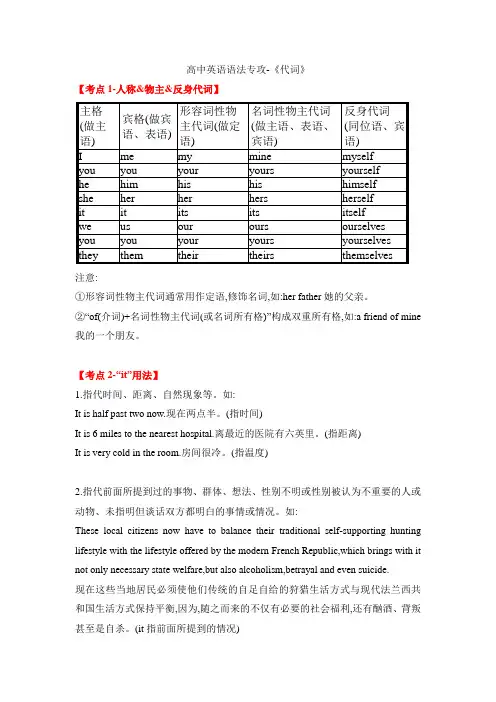
高中英语语法专攻-《代词》【考点1-人称&物主&反身代词】注意:①形容词性物主代词通常用作定语,修饰名词,如:her father她的父亲。
②“of(介词)+名词性物主代词(或名词所有格)”构成双重所有格,如:a friend of mine 我的一个朋友。
【考点2-“it”用法】1.指代时间、距离、自然现象等。
如:It is half past two now.现在两点半。
(指时间)It is 6 miles to the nearest hospital.离最近的医院有六英里。
(指距离)It is very cold in the room.房间很冷。
(指温度)2.指代前面所提到过的事物、群体、想法、性别不明或性别被认为不重要的人或动物、未指明但谈话双方都明白的事情或情况。
如:These local citizens now have to balance their traditional self-supporting hunting lifestyle with the lifestyle offered by the modern French Republic,which brings with it not only necessary state welfare,but also alcoholism,betrayal and even suicide.现在这些当地居民必须使他们传统的自足自给的狩猎生活方式与现代法兰西共和国生活方式保持平衡,因为,随之而来的不仅有必要的社会福利,还有酗酒、背叛甚至是自杀。
(it指前面所提到的情况)—Who’s that at the door?—It is the milkman.——门口那人是谁?——是送奶工。
(it指代性别不明或性别被认为不重要的人)—I’ve broken a plate.我打碎了一个盘子。
—It(=Breaking the plate) doesn’t matter.没关系。
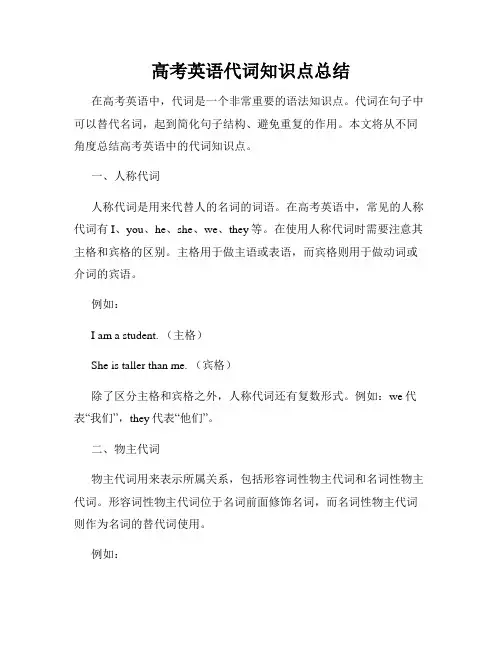
高考英语代词知识点总结在高考英语中,代词是一个非常重要的语法知识点。
代词在句子中可以替代名词,起到简化句子结构、避免重复的作用。
本文将从不同角度总结高考英语中的代词知识点。
一、人称代词人称代词是用来代替人的名词的词语。
在高考英语中,常见的人称代词有I、you、he、she、we、they等。
在使用人称代词时需要注意其主格和宾格的区别。
主格用于做主语或表语,而宾格则用于做动词或介词的宾语。
例如:I am a student. (主格)She is taller than me. (宾格)除了区分主格和宾格之外,人称代词还有复数形式。
例如:we代表“我们”,they代表“他们”。
二、物主代词物主代词用来表示所属关系,包括形容词性物主代词和名词性物主代词。
形容词性物主代词位于名词前面修饰名词,而名词性物主代词则作为名词的替代词使用。
例如:This is my book. (形容词性物主代词)The red one is mine. (名词性物主代词)在使用物主代词时,需要根据名词的单复数和所有格进行变化。
例如,单数名词后加's,复数名词只加'。
三、反身代词反身代词用来指示动作的承受者与动作的发出者是同一个人。
常见的反身代词有myself、yourself、himself、herself、ourselves、themselves等。
例如:He hurt himself while playing football. (他在踢足球时受伤了)另外,反身代词可以用来强调主语:I myself will finish the task. (我自己会完成这个任务)四、指示代词指示代词用来指示人或物的位置、距离和数量等信息。
常用的指示代词有this、that、these、those等。
例如:This is my bag. (这是我的包)Those are my friends. (那些是我的朋友)指示代词还可以与名词连用来修饰名词,表示特指。
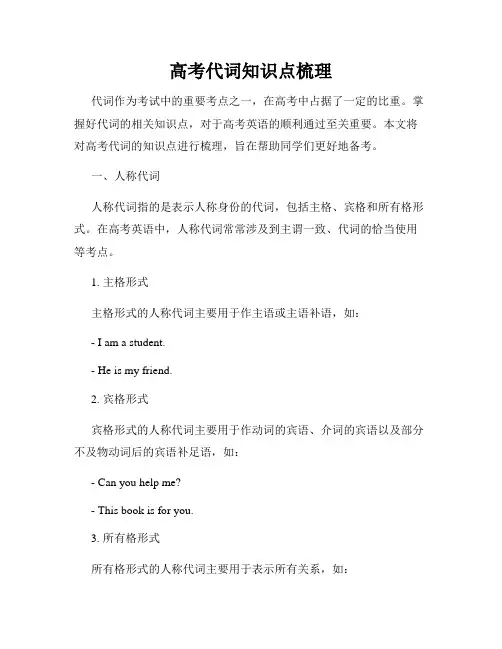
高考代词知识点梳理代词作为考试中的重要考点之一,在高考中占据了一定的比重。
掌握好代词的相关知识点,对于高考英语的顺利通过至关重要。
本文将对高考代词的知识点进行梳理,旨在帮助同学们更好地备考。
一、人称代词人称代词指的是表示人称身份的代词,包括主格、宾格和所有格形式。
在高考英语中,人称代词常常涉及到主谓一致、代词的恰当使用等考点。
1. 主格形式主格形式的人称代词主要用于作主语或主语补语,如:- I am a student.- He is my friend.2. 宾格形式宾格形式的人称代词主要用于作动词的宾语、介词的宾语以及部分不及物动词后的宾语补足语,如:- Can you help me?- This book is for you.3. 所有格形式所有格形式的人称代词主要用于表示所有关系,如:- This is my book.- Is that your pencil?二、指示代词指示代词用于指示特定的人或物,包括近指示代词和远指示代词。
在高考中,指示代词常涉及到考生对句子结构的理解和翻译能力。
1. 近指示代词近指示代词主要用于指示距离说话者较近的人或物,如:- This is my bag.- These are my friends.2. 远指示代词远指示代词主要用于指示距离说话者较远的人或物,如:- That is his car.- Those are their houses.三、相互代词相互代词主要用于表示两个或多个人或物之间的相互关系,常见的相互代词有each other和one another。
在高考中,相互代词常常涉及到对人际关系的描述和理解。
1. each othereach other用于表示两个人之间的相互关系,如:- They love each other.- The twins look exactly like each other.2. one anotherone another用于表示两个或多个人之间的相互关系,如:- The team members often help one another.- The students learn from one another.四、不定代词不定代词用于代替不具体指称的人或物,常常涉及到复数、单数、可数、不可数等概念的区分。
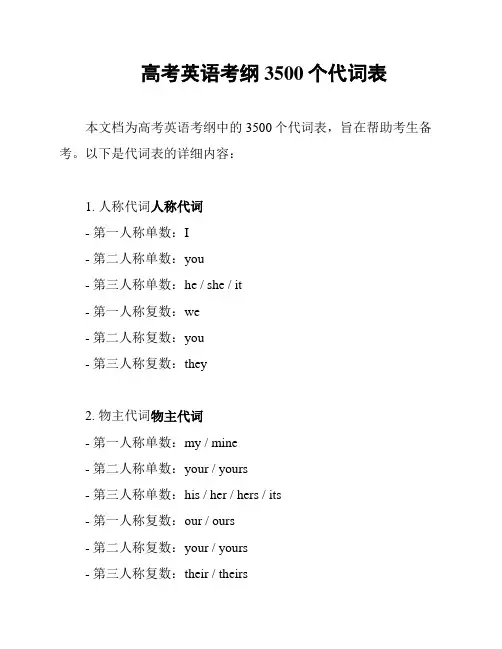
高考英语考纲3500个代词表本文档为高考英语考纲中的3500个代词表,旨在帮助考生备考。
以下是代词表的详细内容:1. 人称代词人称代词- 第一人称单数:I- 第二人称单数:you- 第三人称单数:he / she / it- 第一人称复数:we- 第二人称复数:you- 第三人称复数:they2. 物主代词物主代词- 第一人称单数:my / mine- 第二人称单数:your / yours- 第三人称单数:his / her / hers / its- 第一人称复数:our / ours- 第二人称复数:your / yours- 第三人称复数:their / theirs3. 反身代词反身代词- 第一人称单数:myself- 第二人称单数:yourself- 第三人称单数:himself / herself / itself - 第一人称复数:ourselves- 第二人称复数:yourselves- 第三人称复数:themselves4. 指示代词指示代词- this / these:指示较近的人或事物- that / those:指示较远的人或事物5. 疑问代词疑问代词- who:用于询问人- whom:用于询问人(宾格)- whose:用于询问所有权- which:用于询问事物/选择- what:用于询问事物/情况6. 关系代词关系代词- who:代替人(主格)- whom:代替人(宾格)- whose:代替所有权- which:代替事物/选择- that:代替人或事物(定语从句中可省略)- where:代替地点- when:代替时间7. 不定代词不定代词- some:一些(肯定)- any:任何(否定/疑问)- no:没有- every:每个- all:所有- both:两者都8. 相互代词相互代词- each other:互相9. 副词性代词副词性代词- all:全部- any:任何- both:两者都- everything:每件事- nothing:没有任何事以上为3500个代词表的主要内容,希望对高考英语备考有所帮助。
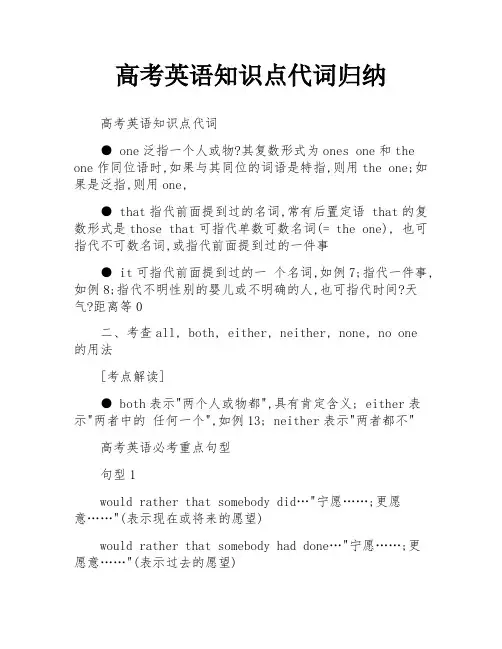
高考英语知识点代词归纳高考英语知识点代词● one泛指一个人或物?其复数形式为ones one和the one作同位语时,如果与其同位的词语是特指,则用the one;如果是泛指,则用one,● that指代前面提到过的名词,常有后置定语 that的复数形式是those that可指代单数可数名词(= the one), 也可指代不可数名词,或指代前面提到过的一件事● it可指代前面提到过的一个名词,如例7;指代一件事,如例8;指代不明性别的婴儿或不明确的人,也可指代时间?天气?距离等0二、考查all, both, either, neither, none, no one的用法[考点解读]● both表示"两个人或物都",具有肯定含义; either表示"两者中的任何一个",如例13; neither表示"两者都不"高考英语必考重点句型句型1would rather that somebody did…"宁愿……;更愿意……"(表示现在或将来的愿望)would rather that somebody had done…"宁愿……;更愿意……"(表示过去的愿望)[例句]I'd rather you posted the letter right now. 我想让你现在去寄信。
I'd rather you were not a celebrated actor. In that case, we could spend more time together.我到情愿你不是个知名演员,这样我们可以有更多的时间在一起。
I'd rather that I hadn't seen her yesterday. 我情愿昨天没有看到她。
句型2as if/though+主语+did/had done…好像……(表示现在或将来的情况用过去时;表示过去的情况用过去完成时)[参考句型4][例句]Our head teacher treats us as if we were her own children, so all the students in our class think highly of her.Alan talked about Rome as if he had been there. Alan谈起罗马来就好像他去过那里似的。
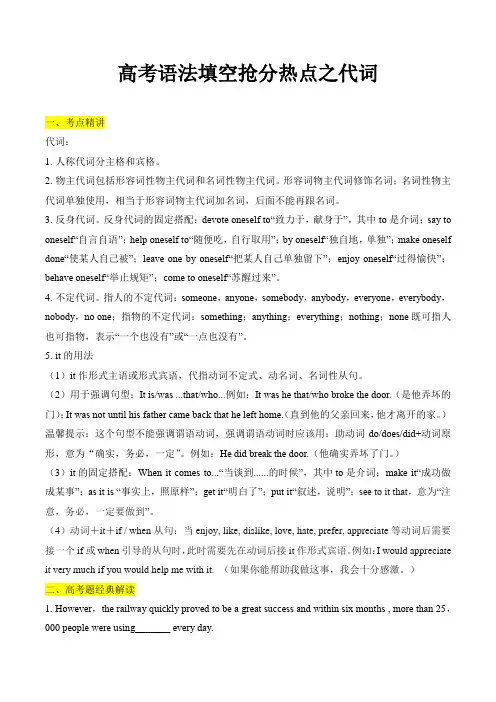
高考语法填空抢分热点之代词一、考点精讲代词:1.人称代词分主格和宾格。
2.物主代词包括形容词性物主代词和名词性物主代词。
形容词物主代词修饰名词;名词性物主代词单独使用,相当于形容词物主代词加名词,后面不能再跟名词。
3.反身代词。
反身代词的固定搭配:devote oneself to“致力于,献身于”,其中to是介词;say to oneself“自言自语”;help oneself to“随便吃,自行取用”;by oneself“独自地,单独”;make oneself done“使某人自己被”;leave one by oneself“把某人自己单独留下”;enjoy oneself“过得愉快”;behave oneself“举止规矩”;come to oneself“苏醒过来”。
4.不定代词。
指人的不定代词:someone,anyone,somebody,anybody,everyone,everybody,nobody,no one;指物的不定代词:something;anything;everything;nothing;none既可指人也可指物,表示“一个也没有”或“一点也没有”。
5.it的用法(1)it作形式主语或形式宾语,代指动词不定式、动名词、名词性从句。
(2)用于强调句型:It is/was ...that/who...例如:It was he that/who broke the door.(是他弄坏的门);It was not until his father came back that he left home.(直到他的父亲回来,他才离开的家。
)温馨提示:这个句型不能强调谓语动词,强调谓语动词时应该用:助动词do/does/did+动词原形,意为“确实,务必,一定”。
例如:He did break the door.(他确实弄坏了门。
)(3)it的固定搭配:When it comes to...“当谈到......的时候”,其中to是介词;make it“成功做成某事”;as it is “事实上,照原样”;get it“明白了”;put it“叙述,说明”;see to it that,意为“注意,务必,一定要做到”。
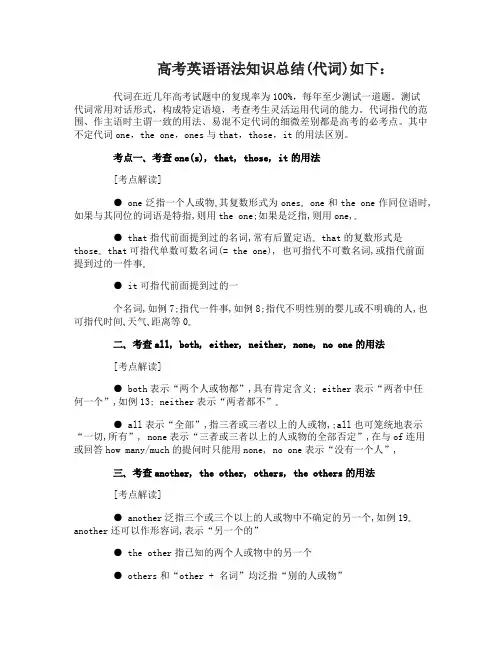
高考英语语法知识总结(代词)如下:代词在近几年高考试题中的复现率为100%,每年至少测试一道题。
测试代词常用对话形式,构成特定语境,考查考生灵活运用代词的能力。
代词指代的范围、作主语时主谓一致的用法、易混不定代词的细微差别都是高考的必考点。
其中不定代词one,the one,ones与that,those,it的用法区别。
考点一、考查one(s), that, those, it的用法[考点解读]● one泛指一个人或物。其复数形式为ones。 one和the one作同位语时,如果与其同位的词语是特指,则用the one;如果是泛指,则用one,。● that指代前面提到过的名词,常有后置定语。 that的复数形式是those。 that可指代单数可数名词(= the one), 也可指代不可数名词,或指代前面提到过的一件事。● it可指代前面提到过的一个名词,如例7;指代一件事,如例8;指代不明性别的婴儿或不明确的人,也可指代时间、天气、距离等0。二、考查all, both, either, neither, none, no one的用法[考点解读]● both表示“两个人或物都”,具有肯定含义; either表示“两者中任何一个”,如例13; neither表示“两者都不”。● all表示“全部”,指三者或三者以上的人或物,;all也可笼统地表示“一切,所有”, none表示“三者或三者以上的人或物的全部否定”,在与of连用或回答how many/much的提问时只能用none, no one表示“没有一个人”,三、考查another, the other, others, the others的用法[考点解读]● another泛指三个或三个以上的人或物中不确定的另一个,如例19。another还可以作形容词,表示“另一个的”● the other指已知的两个人或物中的另一个● others和“other + 名词”均泛指“别的人或物”● the others指“一定范围内其余的人或物”,如例23。如果被指代的名词是不可数名词,则用the rest替代,四、考查(a) little, (a) few, some, any的用法[考点解读]● few和little可用作代词和形容词。 few和a few可以修饰或代替可数名词复数。 few有否定含义, a few有肯定含义, little和a little可以修饰或代替不可数名词。 little有否定含义, a little含肯定含义,。● some和any表示“一些”,可用作代词和形容词。 some用于肯定句,如例31; any用于否定句、疑问句和条件句中, some也可用于疑问句,如例32和例33; any也可用于肯定陈述句中,表示“任何一个”,五、考查something, somebody, someone, anything, anybody, anyone, nothing, nobody, everything, everybody的用法及它们与else的搭配[考点解读]● 由some和any构成的不定代词的用法和some和any的用法基本一致。● nothing和nobody/no one表示全部否定。● 无论在肯定句、否定句还是疑问句中, everything和everyone (everybody) 都表示“全部,所有”。● 不定代词后跟else时,表示“另外的,其他的”;形容词修饰something/anything/nothing时,应置于不定代词之后。以上不定代词连写时,不和of连用,every one可和of连用。【高考英语代词语法知识精选试题】名校模拟题及其答案1. I agree with most of what you said, but I don’t agree with______.A. everythingB. anythingC. somethingD. nothing2. “What do you think of them?” “I don’t know _____ is better, so I’ve taken _____ of them.”A. what, bothB. what, noneC. which, both C. which, none3. “Would you like a cup of coffee or a glass of beer?” “____ will do, but milk is _____ popular with me.”A. Neither, notB. Both, moreC. Either, the mostD. All, the most4. I read about it in some book or other, does it matter _____ it was?A. whereB. whatC. howD. which5“Who told you?” “Oh, somebody or other, I’ve forgotten_____.”A. whatB. whenC. whichD. who6.Some of the students were late for the meeting, but I can’t remember _____.A. whatB. whenC. whichD. whom7. These trousers are dirty and wet —I’ll change into my_____.A. anotherB. trousersC. othersD. other8. Her lecture was hard to follow because she kept jumping from one subject to _____.A. otherB. the otherC. the othersD. another9. There are four bedrooms, ______ with its own bathroom.A. allB. eachC. everyD. either10. “It’s said that he is a wise leader.” “Oh, no, he is_____ but a wise leader.”A. anythingB. anyoneC. anybodyD. anywhere11.I didn’t make clear when and where the sports meet would be held.A.this B that C it D one12 To tell you the truth..really don't like when people talk with you with their eyes stating into the sky.A.which B that C it D.what13.一Which one can I take?一You can take of them;I’ll keep none.A.bothB.anyC.eitherD.all14.一Which coat would you prefer.sir?一I’ll take ,to have n change so metimes.A.allthemB.them dlC.both them D them b0Ih15.The movie is boring;it is,in fact,rather exeiting and interestingA anything butB nothing butC no moreD all but16 Alan sold most of his belongings.He has hardly left in the houseA.everythingB.anythingC.nothing D something17.I have been lived in Shanghai for two years.butI haven’t covered of the cityA.anythingB.much C many D plenty18.She kept looking behind to see if she was being followedA her B.herself C.her own D.she19.All of us want very much to see these recommended movies,especially you referred to jusl now.A asB whichC the oneD that20.If a studem can make what has been learned whether in class of from social practice ,he will make steady progress.A heB himC himselfD his21.一Do you want tea or coffee?一 really don't mindA.None B Neither C Either D All22.The manager believes prices will not rise by more than four percent.A.any other B the other C another D other23.The manager was very angry,for he had sent his business partner two thousand machines yesterdy,half of unqualified.A.whom B what C them D.which24一Did you visit many places while you were in Canada?一Yes,A.afew quite B only few C.only afew D quite few25 In somecountries, is callede quality does not really mean equal rights for all peopleA thatB whatC whichD how26一May I have a glass of beer.please?一Beer?Sorry,there is left,but would you mind having,some juice instead?A none B.no one C nothing D few27.一When can we goto visit you?一Anytime you feel likeA.one B it C so D thal28 We need a more capable leader, with strong will as well as good humour.A who B.that C.one D.which29.The number 2008 is a special number, I think,that will be remembered hy the Chinese forever.A.which B what C one D.it30.一How do you like his wife?一She is like a good housekeeper,for the children's room is always in a terrible mess.A SomebodyB nobodyC something D.nothing——答案与解析——1【解析】此题应选 A,注意前文的 I agree with most of what you said(我同意你说的大部分内容),其后的not 与 everything 构成部分否定,意为“不是所有的都同意”,前后两部分用转折连词 but 连接,语气通顺、连贯。

考向02 从不随随便便的“代词”代词是高考中必考的考点,也是学习中容易出现混淆的知识点。
代词包括人称代词、物主代词、反身代词、指示代词、不定代词、相互代词、关系代词、疑问代词等。
本小节我们按照高考考查知识点的分类,把相关知识点重新分类讲解,同时对某些知识点单独拿出来设模块讲解,例如it的用法等。
知识点一:人称代词、物主代词、反身代词(下称为代词表格)1)人称代词有主格和宾格之分。
通常主格作主语,宾格作宾语。
如:I like table tennis. (作主语)Do you know him?(作宾语)2)人称代词还可作表语。
作表语时用宾格。
如:---Who is knocking at the door?---It’s me.3)人称代词在than之后与其他人或事物进行比较时,用主格和宾格都可以。
如:He is older than me.He is older than I am.4)形容词性物主代词的作用相当于形容词,可在句中作定语。
例如:Our teacher is coming to see us.This is her pencil-box.5)名词性物主代词的作用相当于名词,在句中可用作主语、宾语和表语。
Our school is here, and theirs is there.(作主语)--- Is this English-book yours? (作表语)--- No. Mine is in my bag.I've already finished my homework. Have you finished yours? (作宾语)注意:1、名词性物主代词=形容词性物主代词+名词(也就是说名词性物主代词后不同再加名词,再改错中名物代后出现名词说明在这里可能时有错的)This is her coat. Mine is over there.=This is her coat.My coat is over there.2、“of + 名词性物主代词”可用作定语。
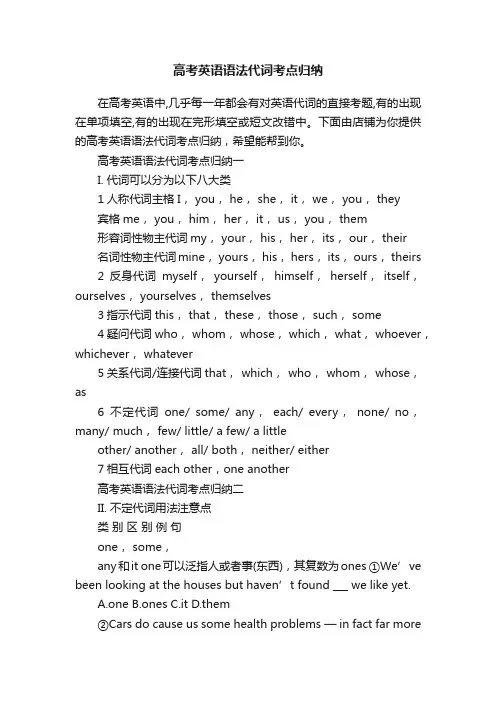
高考英语语法代词考点归纳在高考英语中,几乎每一年都会有对英语代词的直接考题,有的出现在单项填空,有的出现在完形填空或短文改错中。
下面由店铺为你提供的高考英语语法代词考点归纳,希望能帮到你。
高考英语语法代词考点归纳一I. 代词可以分为以下八大类1人称代词主格I, you, he, she, it, we, you, they宾格me, you, him, her, it, us, you, them形容词性物主代词my, your, his, her, its, our, their名词性物主代词mine, yours, his, hers, its, ours, theirs 2反身代词myself,yourself,himself,herself,itself,ourselves, yourselves, themselves3指示代词this, that, these, those, such, some4疑问代词who, whom, whose, which, what, whoever,whichever, whatever5关系代词/连接代词that, which, who, whom, whose,as6不定代词one/ some/ any,each/ every,none/ no,many/ much, few/ little/ a few/ a littleother/ another, all/ both, neither/ either7相互代词each other,one another高考英语语法代词考点归纳二II. 不定代词用法注意点类别区别例句one, some,any和it one可以泛指人或者事(东西),其复数为ones ①We’ve been looking at the houses but haven’t found ___ we like yet.A.oneB.onesC.itD.them②Cars do cause us some health problems — in fact far moreserious _______ than mobile phones do.A.oneB.onesC.itD.thosesome可用于疑问句中,表示盼望得到肯定的答复,或者表示建议,请求等—Your coffee smells great! —It’s from Mexico.Would you like ________?A.itB.someC.thisD.1ittlesome 和any修饰可数名词单数时,some表示某个,any表示任何一个①I have read this article in some magazin e. Please correct the mistakes, if any.②—Which of the three ways shall I take to the village?—________way as you please.A.EachB.EveryC.AnyD.Eitherone指同类中的一个,it指代同一种类的东西。
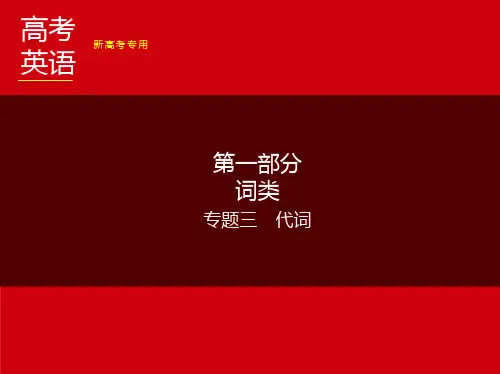
代词、介词和介词短语考点01 代词1.(2024年浙江卷1月·语法填空)Who knows, perhaps some of the more forward-looking ________ (one) may yet come out with a whole range of “just for you” pack sizes with special offers as well.【答案】ones【解析】考查代词。
句意:谁知道呢,也许一些更有远见的人可能还会推出一系列“只为你”的包装尺寸,并提供特别优惠。
代词one意为“一个人”,在some of后应用复数形式。
故填ones。
preserved for all people of the nation to enjoy-as a national park.【答案】its【解析】考查代词。
句意:这个地方,以其独特而令人惊叹的自然美景,必须被妥善保存供全国人民欣赏。
这里“它们”用形容词性物主代词做定语修饰名词beauty。
3.(2023年全国甲卷改错)In that class, Miss Zhao, our biology teacher, showed we insects on stamps.【答案】we→us【解析】考查代词。
句意:在那节课上,我们的生物老师赵老师给我们看了邮票上的昆虫。
作动词show的宾语,应用宾格us。
故we改为us。
4.(2023年全国乙卷改错)Last Friday my mom decided to color his hair. She studied with all the hair products at the drugstore.【答案】his → her【解析】考查代词。
句意:上周五,我妈妈决定染头发。
此处指“我妈妈染她的头发”,应用代词her。
故his 改为her。
5.(2022年北京卷语法填空)Since people can’t always eat out or cook for ________ (they), they get takeout or order delivery.【答案】themselves【解析】考查反身代词。
代词高考知识点总结归纳代词作为英语语法中的一个重要部分,是我们日常交流中必不可少的一种词类。
在高考英语中,代词也是一个重要的考点,掌握代词的相关知识点对于正确理解和使用代词至关重要。
本文将对代词的相关知识点进行总结归纳,帮助读者更好地掌握这一语法要点。
一、人称代词人称代词是指用来代替人称的词类,主要包括主格代词和宾格代词。
主格代词在句子中作主语,宾格代词在句子中作宾语或补语。
1. 主格代词:I, you, he, she, it, we, they例句:- I am a student.- She is my sister.2. 宾格代词:me, you, him, her, it, us, them例句:- Can you help me with my homework?- I saw him at the party.二、物主代词物主代词用来表示所属关系,主要包括形容词性物主代词和名词性物主代词。
1. 形容词性物主代词:my, your, his, her, its, our, their例句:- This is my car.- Is this your book?2. 名词性物主代词:mine, yours, his, hers, its, ours, theirs例句:- The red car is mine.- Is this pen yours?三、指示代词指示代词用来指出或代替特定的人或事物,主要包括this, that, these, those等。
1. this和these用于表示离说话人较近的人或事物。
例句:- This is my friend.- These are my new shoes.2. that和those用于表示离说话人较远的人或事物。
例句:- That is his house.- Those are the books I borrowed from the library.四、疑问代词疑问代词用来提问特定的人或事物,主要包括who, whom, whose, what, which等。
代词高考知识点总结大全一、代词的种类1. 人称代词:包括主格和宾格两种形式,主格用来作主语或表语,宾格用来作宾语。
例如:I(我)、you(你)、he(他)、she(她)、it(它)、we(我们)、they(他们)等。
2. 物主代词:用来表示所属关系,包括形容词性物主代词和代词性物主代词。
形容词性物主代词用在名词前,代词性物主代词则可以直接替代名词。
例如:my(我的)、your(你的)、his(他的)、her(她的)、its(它的)、our(我们的)、their(他们的)等。
3. 反身代词:用来指示动作的执行者同时也是动作的承受者,即“自己”。
例如:myself(我自己)、yourself(你自己)、himself(他自己)、herself(她自己)、itself(它自己)、ourselves(我们自己)、yourselves(你们自己)、themselves(他们自己)等。
4. 指示代词:用来指示人或物的特点或位置,包括人称和物主两种形式。
例如:this(这个)、that(那个)、these(这些)、those(那些)等。
5. 疑问代词:用来引导疑问句,可以代替名词或代词。
例如:who(谁)、whom(谁)、whose(谁的)、which(哪个)、what(什么)等。
6. 关系代词:用来引导定语从句,代替先行词并在从句中作某一句子成分。
例如:who (谁)、whom(谁)、whose(谁的)、which(哪个)、what(什么)等。
7. 不定代词:指代不特指的人或事物,没有明确的指示对象。
例如:somebody(某人)、anybody(任何人)、nobody(没有人)、something(某物)、anything(任何事物)、nothing(没有东西)等。
二、代词的用法1. 人称代词的用法:用作主语时,要和谓语动词的数保持一致;用作宾语时,要根据动词的情况选择宾格或者主格形式;用作表语时,要选择主格形式。
2019年高考英语语法必考考点(3):代词李仕才【考点解读】概述一、人称代词:人称代词有主格和宾格之分,主格在句中作主语、表语等成分,宾格在句中作动词、介词宾语、同位语等成分,有时也可作表语。
不仅指人,也可指物,有人称和数的变化。
【注意】在连词than和as引导的比较状语从句中常常省略从句,只保留人称代词,人称代词作主语时要用主格,在口语中也常用宾格;但当人称代词后有动词时就必须用主格。
如:My sister speaks English as well as me/I. (口语中常用me)My sister speaks English as well as I do. (此时只能用I)二、物主代词:1.物主代词分为形容词性物主代词和名词性物主代词,必须与所指的名词在人称、数和性别方面保持一致。
如:The waiters offered their food to the homeless man.【注意】单数阳性名词和单数阴性名词连用作主语时,如果前面有every,each修饰,谓语动词用单数,代词用his。
如:Each boy and each girl wants to lend his raincoat to the soldiers.2. 形容词性物主代词相当于形容词,只能作名词或动名词的定语。
e.g. This is our classroom.Would you mind my opening the window?3. 名词性物主代词相当于“形容词性物主代词+名词”,可单独作主语、宾语、表语。
此外,名词性物主代词还可与名词及of连用,构成双重所有格。
如:This is her coat. Mine is over there.Some friends of mine will attend my birthday party.三、反身代词:1. 反身代词通常在enjoy, teach, hurt, buy, introduce, seat, dress, express, amuse, behave等动词和by, for, to, of等介词后作宾语。
如:He was left at home by himself the whole day yesterday.2. 反身代词可以作主语的同位语,主要起加强语气的作用,意为“亲自,本人,亲身”。
e.g. The teacher and pupils mended the road themselves.3. 反身代词可以在be, feel, look, seem等系动词后作表语,表示身体或精神状态处于正常。
e.g. —You look pale. What’s wrong with you?—I’m not feeling myself today, not serious, though.注意(1)反身代词本身不能单独作主语。
(正) I myself drove the car. 我自己开车。
(误) Myself drove the car.(2) 在由and, or, nor连接的并列主语中,第二个主语可用反身代词,特别是myself 作主语。
e.g. Charles and myself saw it.(3) 在不强调的情况下,but, except, for等介词后宾语用反身代词或人称代词均可。
e.g. No one but myself/me is hurt.4. 反身代词的习惯搭配(1) 介词+反身代词for oneself 为自己;亲自地to oneself 对自己;独用of oneself 自动地by oneself 独自地(2) 动词+反身代词dress oneself 自己穿衣make oneself at home 不要客气seat oneself=be seated 就坐teach oneself 自学come to oneself 苏醒devote oneself to = be devoted to 致力于enjoy oneself 过得愉快,玩得高兴help oneself to 自行取用,请自便accustom oneself to=be accustomed to 习惯于amuse oneself 消遣,自娱behave oneself 表现良好apply oneself to sth. 致力于explain oneself 说明自己的意图express oneself 表达自己的思想abandon oneself to 沉迷于,放纵四、指示代词:1. 指上文提到的事物,一般用that,有时也用this;指下文将要提到的事物,常用this或these。
如:He said I was lying, and that was unfair. (that指代上文He said I was lying) What I want you to remember is this:Practise makes perfect. (此句中this指代下文,不能换为that)2. that/those可作定语从句的先行词,但this/these不能;其中those可指人,但that不能。
如:She has known that which she wanted to know.I admire those who are always helping others. (those作定语从句的先行词,指人)五、相互代词:相互代词是表示相互关系的代词,只有each other和one another两个词组,都表示“互相,相互”。
1. each other和one another在句中可以作动词或介词的宾语。
如:Let’s help each other and learn from each other.They looked at one another and laughed.2. 作定语时each other和one another须用所有格,表示“彼此的”。
如:We said hello to one another’s/each other’s family.六、疑问代词:1. 疑问代词后接ever的用法。
(1) whatever/whoever/whomever/whichever表泛指,意为“无论……”。
如:You have our support, whatever you decide.Whichever of you gets here first will get the prize.I don’t want to see them, whoever they are.(2) 置于疑问代词后,用于加强语气。
如:Whatever do you mean?Whoever heard of such a thing!2. 疑问代词的单复数形式要由所代表的人或事物的单复数形式来确定,如果不清楚代表的人或物是复数还是单数,则谓语动词多用单数形式。
who/what/which作主语时,谓语动词既可以用单数形式,也可以用复数形式。
如:What he needs most is his mother’s love.What we need are good books.七、复合不定代词:1. 修饰不定代词的形容词应后置。
e.g. Is there anything wrong with my car?2. 复合不定代词作主语时,谓语动词往往用第三人称单数形式。
3. 复合不定代词构成的固定短语:anything but根本不,一点也不nothing but只不过do nothing but 只有,除……之外什么事也不做have something/nothing to do with 与……有/无关something of有点,有几分八、全部否定与部分否定:由some和any构成的不定代词的用法与some和any的用法基本一致。
all, both, everyone, everybody, everything以及“every+名词”都表示全部肯定;no one, none, nobody, nothing, not...any以及“no+名词”都表示全部否定;但当not出现在含有全部肯定的不定代词的句子中,不管not在它们之前还是在它们之后都表示部分否定。
此外not与总括性副词如everywhere, always, wholly, altogether 等连用时也表示部分否定。
e.g. All of the boys are clever, but none of them can work out this problem. (all表示全部肯定,none表示全部否定)Such a thing can’t be found everywhere. (“not+everywhere”表示部分否定)The exam is very easy, but not all of the students can pass it. (“not+all”表示部分否定)九、both, either, neither, each, all, none:both表示两者都,具有肯定含义;either表示两者中的任何一个;neither表示两者都不;each表示两者或两者以上的每一个;all表示全部,指三者或三者以上的人或物,也可笼统地表示“一切,所有”;none表示三者或三者以上的人或物的全部否定,与of连用或用来回答how many / much的提问。
十、it作人称代词:在特定的环境中,it也可指人,如指婴儿、性别不详或身份不明的人。
e.g. The baby stopped crying as soon as it saw the woman.—Who is it?—It’s me.十一、it作形式主语或形式宾语:it可以作形式主语或形式宾语而把真正的主语或宾语后置。
1. 用it作形式主语的主语从句结构:(1) It+系动词+形容词+that从句:It is necessary/important/surprising/strange+that从句,从句中谓语动词常用“should+动词原形”形式,且should可省略。
(2) It+系动词+名词+that从句:It is a pity/a shame/good news/a fact/an honour/a wonder/no wonder/our duty +that从句。
e.g. It’s no wonder that you’ve achieved so much success.(3) It+不及物动词+that从句:It seems/happened/turned out /occurs/appears+that从句。